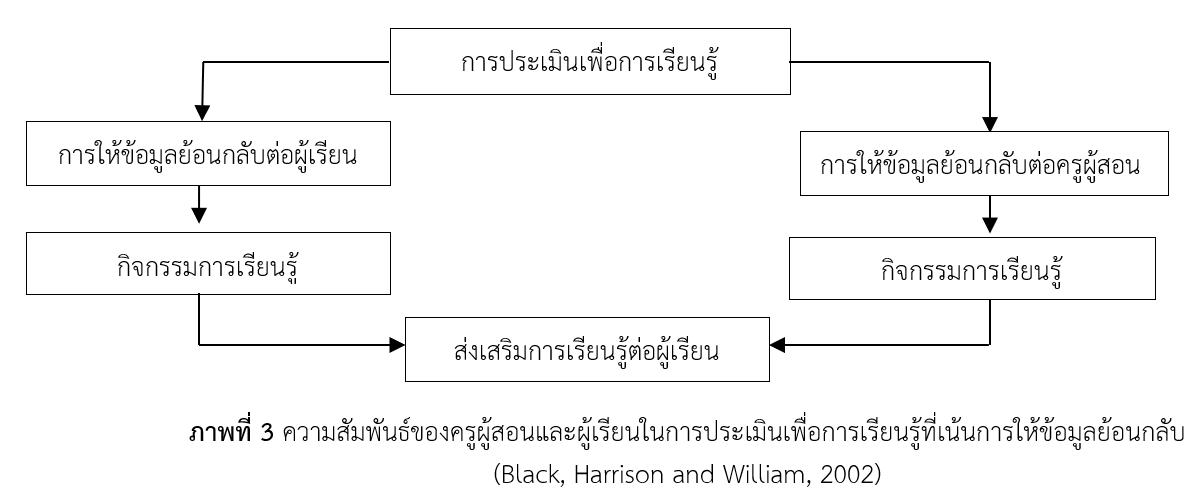การประเมินเพื่อการเรียนรู้และการประเมินเป็นการเรียนรู้: รูปแบบการประเมินการเรียนรู้วิชาวิทยาศาสตร์ปรับใหม่
Main Article Content
บทคัดย่อ
การประเมินกับการเรียนรู้เป็นสิ่งที่เกิดไปควบคู่กัน ดังนั้นการประเมินเพื่อการเรียนรู้ และ การประเมินเป็นการเรียนรู้จึงถูกนำมาใช้เป็นแนวทางการจัดการเรียนรู้ที่เน้นการเรียนรู้แบบผู้เรียนเป็นสำคัญที่มุ่งพัฒนาผู้เรียนให้มีทักษะ ที่จำเป็นต่อการดำรงชีวิตในศตวรรษที่ 21 รวมทั้งเป็นกำลังคนด้านวิทยาศาสตร์และเทคโนโลยีที่จะเปลี่ยนแปลงในอนาคต เนื่องจากการประเมินทั้งสองรูปแบบนี้ให้ข้อมูลสารสนเทศในการปรับปรุงการเรียนรู้ของผู้เรียนและทราบข้อบกพร่องของครูที่เกิดขึ้นตลอดช่วงระยะเวลาการจัดการเรียนสอน ผู้เรียนเกิดแรงจูงใจในการเรียนรู้และเรียนรู้ดีขึ้นเมื่อได้ประเมินตนเอง การประเมินเพื่อการเรียนรู้เป็นการรวบรวมสารสนเทศระหว่างการจัดการเรียนรู้ เพื่อนำไปปรับปรุงการจัดการเรียนรู้ของครูและการเรียนรู้ของผู้เรียน และการประเมินเป็นการเรียนรู้ เป็นการสะท้อนการคิดเกี่ยวกับการเรียนรู้ของผู้เรียนเองซึ่งช่วยในการปรับปรุงการเรียนรู้ของตนเองและของเพื่อน ซึ่งต่างจากการแนวทางการประเมินผลการเรียนรู้แบบเดิมที่เน้นเพียงตัดสินผลการเรียนเมื่อสิ้นสุดการเรียนการสอนเท่านั้น
Article Details

อนุญาตภายใต้เงื่อนไข Creative Commons Attribution-NonCommercial-NoDerivatives 4.0 International License.
วารสารวิทยาศาสตร์และวิทยาศาสตร์ศึกษา (JSSE) เป็นผู้ถือลิสิทธิ์บทความทุกบทความที่เผยแพร่ใน JSSE นี้ ทั้งนี้ ผู้เขียนจะต้องส่งแบบโอนลิขสิทธิ์บทความฉบับที่มีรายมือชื่อของผู้เขียนหลักหรือผู้ที่ได้รับมอบอำนาจแทนผู้เขียนทุกนให้กับ JSSE ก่อนที่บทความจะมีการเผยแพร่ผ่านเว็บไซต์ของวารสาร
แบบโอนลิขสิทธิ์บทความ (Copyright Transfer Form)
ทางวารสาร JSSE ได้กำหนดให้มีการกรอกแบบโอนลิขสิทธิ์บทความให้ครบถ้วนและส่งมายังกองบรรณาธิการในข้อมูลเสริม (supplementary data) พร้อมกับนิพนธ์ต้นฉบับ (manuscript) ที่ส่งมาขอรับการตีพิมพ์ ทั้งนี้ ผู้เขียนหลัก (corresponding authors) หรือผู้รับมอบอำนาจ (ในฐานะตัวแทนของผู้เขียนทุกคน) สามารถดำเนินการโอนลิขสิทธิ์บทความแทนผู้เขียนทั้งหมดได้ ซึ่งสามารถอัพโหลดไฟล์บทความต้นฉบับ (Manuscript) และไฟล์แบบโอนลิขสิทธิ์บทความ (Copyright Transfer Form) ในเมนู “Upload Submission” ดังนี้
1. อัพโหลดไฟล์บทความต้นฉบับ (Manuscript) ในเมนูย่อย Article Component > Article Text
2. อัพโหลดไฟล์แบบโอนลิขสิทธิ์บทความ (Copyright Transfer Form) ในเมนูย่อย Article Component > Other
ดาวน์โหลด ไฟล์แบบโอนลิขสิทธิ์บทความ (Copyright Transfer Form)
เอกสารอ้างอิง
Berry, R, (2005). Functional Significance of Feedback Learning. Proceedings of Australia Association for Research in Education Annual Conference (pp. BER05533). Retrieved 31 January 2022, from Australia Association for Research in Education: https://www.aare.edu.au/data/publications/2005/ber05533.pdf.
Black, P., & William, D. (1998). Inside the black box: raising standards through classroom assessment. Phi Delta Kappan, 8(2), 139-148.
Black, P. Harrison, C., Lee, C. and D. William. (2002). Working inside the black box: Assessment for Learning in the classroom. London: King’s College London.
Brown, G., Bull, J. and Pendlebury. (1997). Assessing student learning in higher education. London: Routledge.
Catholic Curriculum Corporation–Central and Western Region. (2016). Growing Successfully in assessment, evaluation and reporting. Retrieved 31 January 2022, from Catholic Curriculum Corporation: http://catholiccurriculumcorp.org/wp-content/uploads/Growing_Successfully.pdf.
Chaiso P. (2017). Assessment of learning of learners. An important process for the teaching profession (in Thai). Educational research and assessment. Department of Education. Kasetsart University.
Chinsin K. (2015). Developing an Assessment Model for Learning Science with an Emphasis on Giving Feedback to lower secondary school students (in Thai). Doctor’s Thesis. Bangkok: Kasetsart University.
Chumkaew S. and Thirawitthayalert P. (2021). Performance in the measurement and evaluation of modern teachers (in Thai). Journal of teacher professional development, 2(2), 1-15.
David, Nicol and Debra, Macfarlane-Dick, (2006). Formative assessment and self-regulated learning: A model and seven principles of good feedback practice. Studies in Higher Education, 31 (2), 199–218
Institute for the Promotion of Teaching Science and Technology. (2017). Indicators and core learning content Science learning subject group (Revised Edition B.E. 2017) according to the core curriculum Basic Education, B.E. 2008 (in Thai). Bangkok: Ministry of Education.
Institute for the Promotion of Teaching Science and Technology. (2003). Science Teacher Standards and technology (in Thai). Bangkok: Teachers Council of Thailand Printing House.
Khamanee T. (2015). Assessment as learning (in Thai). Journal of the Royal Institute, 40(3), 155-173.
Khetjaturad C. (2017). Methods and tools to assess the learning of learners (in Thai ). Khon Kaen: Faculty of Education, Khon Kaen University.
Ministry of Education. (2017). Core Curriculum of Basic Education Year 2008 (Revised Edition B.E. 2017) (in Thai). Bangkok: Agricultural Cooperative Community Printing House of Thailand Limited.
Mayer, J. and Hillman, S. (1996). Assessing student thinking through writing. Mathematics Teacher, 89(5), 428-432.
Office of the National Education Commission. (2000). Minutes of the seminar for consideration Research Report on Teacher Production and Development Policy (in Thai). Bangkok: Office of Teacher Professional Reform.
Sangchum J. (2020). Development of STEM - style learning management with an emphasis on problem - solving to develop skills in Analytical thinking and good attitudes towards STEM of Grade 4 students in relation to quantity (in Thai). Master’s Thesis. Bangkok: The King Mongkut's University of Technology Thonburi.
Stiggins, R. (2005). Form Formative Assessment to Assessment for Learning: Pat to success in standards-based school. Phi Delta Kappan, 87(4), 324-328.
The New South Wales (Australia) Education Standards Authority. (2017). Summary of assessment for, as, and of learning. Retrieved 31 January 2022, from Learner’s Mindset: https://www.learnersmindset.com/blog/assessment-of-for-as-learning.


